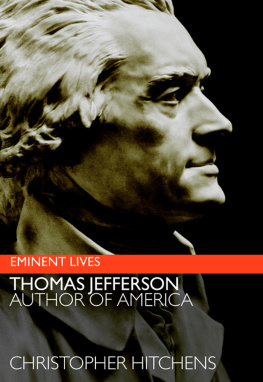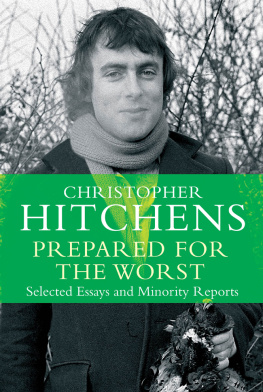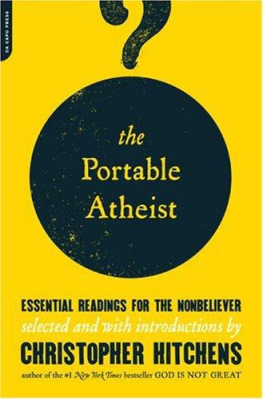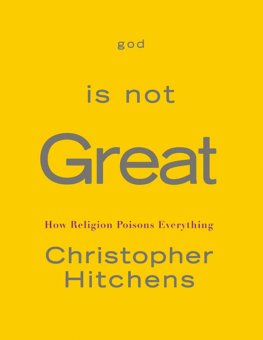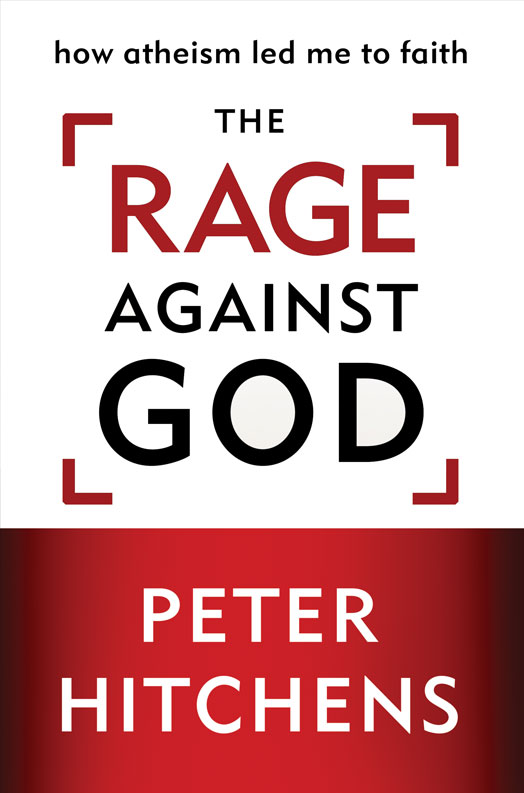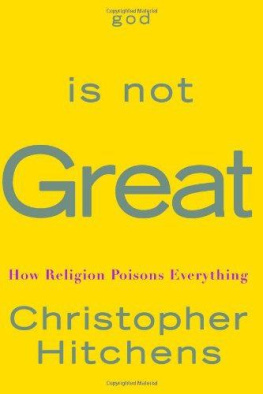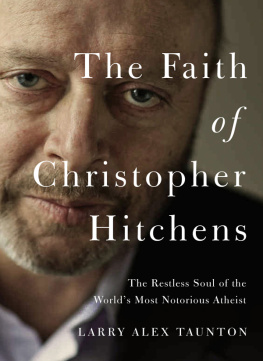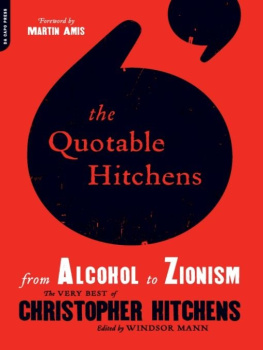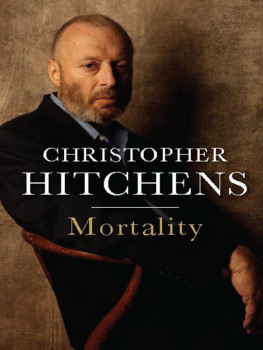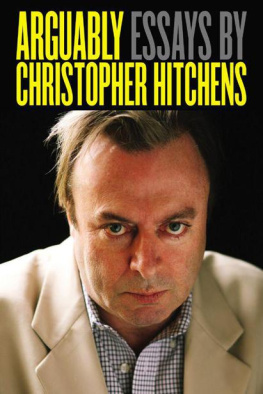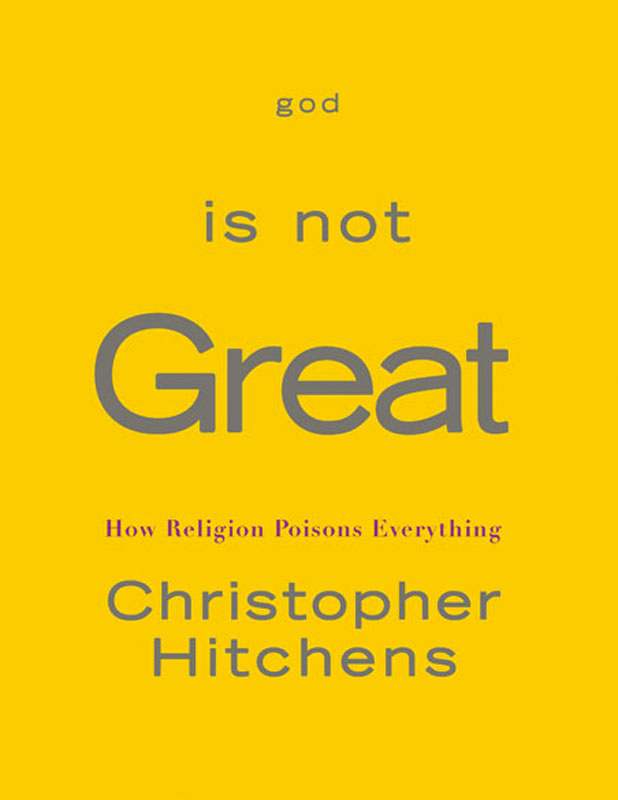Copyright 2007 by Christopher Hitchens
All rights reserved. Except as permitted under the U.S. Copyright Act of 1976,
no part of this publication may be reproduced, distributed, or transmitted in
any form or by any means, or stored in a database or retrieval system, without
the prior written permission of the publisher.
Twelve
Hachette Book Group
237 Park Avenue
New York, NY 10017
Visit our website at www.HachetteBookGroup.com.
The Twelve Books name and logo are trademarks of Hachette Book Group, Inc.
First eBook Edition: May 2007
ISBN: 978-0-446-19534-8
also by Christopher Hitchens
BOOKS
Hostage to History: Cyprus from the Ottomans to Kissinger
Blood, Class and Nostalgia: Anglo-American Ironies
Imperial Spoils: The Curious Case of the Elgin Marbles
Why Orwell Matters
No One Left to Lie To:
The Triangulations of William Jefferson Clinton
Letters to a Young Contrarian
The Trial of Henry Kissinger
Thomas Jefferson: Author of America
Thomas Paines Rights of Man: A Biography
PAMPHLETS
Karl Marx and the Paris Commune
The Monarchy: A Critique of Britains Favorite Fetish
The Missionary Position: Mother Teresa in Theory and Practice
A Long Short War: The Postponed Liberation of Iraq
COLLECTED ESSAYS
Prepared for the Worst: Essays and Minority Reports
For the Sake of Argument
Unacknowledged Legislation: Writers in the Public Sphere
Love, Poverty and War: Journeys and Essays
COLLABORATIONS
James Callaghan: The Road to Number Ten (with Peter Kellner)
Blaming the Victims (edited with Edward Said)
When the Borders Bleed: The Struggle of the Kurds
(photographs by Ed Kashi)
International Territory: The United Nations
(photographs by Adam Bartos)
For Ian McEwan
In serene recollection of
La Refulgencia
Oh, wearisome condition of humanity,
Born under one law, to another bound;
Vainly begot, and yet forbidden vanity,
Created sick, commanded to be sound.
FULKE GREVILLE, Mustapha
And do you think that unto such as you
A maggot-minded, starved, fanatic crew
God gave a secret, and denied it me?
Well, wellwhat matters it? Believe that, too!
THE RUBAIYAT OF OMAR KHAYYAM
(RICHARD LE GALLIENNE TRANSLATION)
Peacefully they will die, peacefully they will expire in your name, and beyond the grave they will find only death. But we will keep the secret, and for their own happiness we will entice them with a heavenly and eternal reward.
THE GRAND INQUISITOR TO HIS SAVIOR in
THE BROTHERS KARAMAZOV
Putting It Mildly
I f the intended reader of this book should want to go beyond disagreement with its author and try to identify the sins and deformities that animated him to write it (and I have certainly noticed that those who publicly affirm charity and compassion and forgiveness are often inclined to take this course), then he or she will not just be quarreling with the unknowable and ineffable creator whopresumablyopted to make me this way. They will be defiling the memory of a good, sincere, simple woman, of stable and decent faith, named Mrs. Jean Watts.
It was Mrs. Wattss task, when I was a boy of about nine and attending a school on the edge of Dartmoor, in southwestern England, to instruct me in lessons about nature, and also about scripture. She would take me and my fellows on walks, in an especially lovely part of my beautiful country of birth, and teach us to tell the different birds, trees, and plants from one another. The amazing variety to be found in a hedgerow; the wonder of a clutch of eggs found in an intricate nest; the way that if the nettles stung your legs (we had to wear shorts) there would be a soothing dock leaf planted near to hand: all this has stayed in my mind, just like the gamekeepers museum, where the local peasantry would display the corpses of rats, weasels, and other vermin and predators, presumably supplied by some less kindly deity. If you read John Clares imperishable rural poems you will catch the music of what I mean to convey.
At later lessons we would be given a printed slip of paper entitled Search the Scriptures, which was sent to the school by whatever national authority supervised the teaching of religion. (This, along with daily prayer services, was compulsory and enforced by the state.) The slip would contain a single verse from the Old or New Testament, and the assignment was to look up the verse and then to tell the class or the teacher, orally or in writing, what the story and the moral was. I used to love this exercise, and even to excel at it so that (like Bertie Wooster) I frequently passed top in scripture class. It was my first introduction to practical and textual criticism. I would read all the chapters that led up to the verse, and all the ones that followed it, to be sure that I had got the point of the original clue. I can still do this, greatly to the annoyance of some of my enemies, and still have respect for those whose style is sometimes dismissed as merely Talmudic, or Koranic, or fundamentalist. This is good and necessary mental and literary training.
However, there came a day when poor, dear Mrs. Watts overreached herself. Seeking ambitiously to fuse her two roles as nature instructor and Bible teacher, she said, So you see, children, how powerful and generous God is. He has made all the trees and grass to be green, which is exactly the color that is most restful to our eyes. Imagine if instead, the vegetation was all purple, or orange, how awful that would be.
And now behold what this pious old trout hath wrought. I liked Mrs. Watts: she was an affectionate and childless widow who had a friendly old sheepdog who really was named Rover, and she would invite us for sweets and treats after hours to her slightly ramshackle old house near the railway line. If Satan chose her to tempt me into error he was much more inventive than the subtle serpent in the Garden of Eden. She never raised her voice or offered violencewhich couldnt be said for all my teachersand in general was one of those people, of the sort whose memorial is in Middlemarch, of whom it may be said that if things are not so ill with you and me as they might have been, this is half-owing to the number who lived faithfully a hidden life, and rest in unvisited tombs.
However, I was frankly appalled by what she said. My little ankle-strap sandals curled with embarrassment for her. At the age of nine I had not even a conception of the argument from design, or of Darwinian evolution as its rival, or of the relationship between photosynthesis and chlorophyll. The secrets of the genome were as hidden from me as they were, at that time, to everyone else. I had not then visited scenes of nature where almost everything was hideously indifferent or hostile to human life, if not life itself. I simply knew, almost as if I had privileged access to a higher authority, that my teacher had managed to get everything wrong in just two sentences. The eyes were adjusted to nature, and not the other way about.
I must not pretend to remember everything perfectly, or in order, after this epiphany, but in a fairly short time I had also begun to notice other oddities. Why, if god was the creator of all things, were we supposed to praise him so incessantly for doing what came to him naturally? This seemed servile, apart from anything else. If Jesus could heal a blind person he happened to meet, then why not heal blindness? What was so wonderful about his casting out devils, so that the devils would enter a herd of pigs instead? That seemed sinister: more like black magic. With all this continual prayer, why no result? Why did I have to keep saying, in public, that I was a miserable sinner? Why was the subject of sex considered so toxic? These faltering and childish objections are, I have since discovered, extremely commonplace, partly because no religion can meet them with any satisfactory answer. But another, larger one also presented itself. (I say presented itself rather than occurred to me because these objections are, as well as insuperable, inescapable.) The headmaster, who led the daily services and prayers and held the Book, and was a bit of a sadist and a closeted homosexual (and whom I have long since forgiven because he ignited my interest in history and lent me my first copy of P. G. Wodehouse), was giving a no-nonsense talk to some of us one evening. You may not see the point of all this faith now, he said. But you will one day, when you start to lose loved ones.


